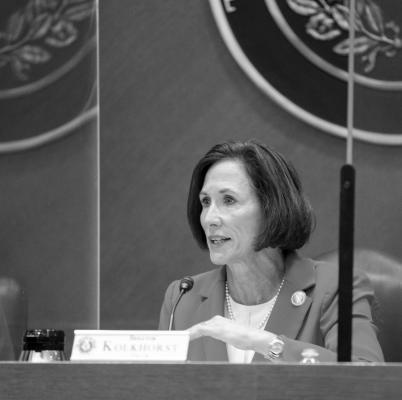Kolkhorst holds COVID-19 hearing
With the 87th Texas Legislature preparing to convene in January, Sen. Lois W. Kolkhorst (R-Brenham) as Chair of the Senate Committee on Health & Human Services, conducted the state’s first public hearings on COVID-19 recently.
“Cases of COVID-19 are rising and our state is still operating under a disaster declaration by the governor. It’s as if we are holding a hearing about the damage of a hurricane, only the hurricane winds are still blowing at maximum capacity,” Kolkhorst said. “Just like any other disaster, the legislature should provide clear, consistent information, and provide reliable solutions. We are gathering all available facts and information to make good decisions.”
Last Monday, the committee examined the procedures for how the state collects, models, and reports data on COVID-19 tests, cases, hospitalizations, and fatalities. Senators heard from Dr. John Hellerstedt, commissioner of the Department of State Health Services, and Dr. James McCarthy, physician in chief at Memorial Hermann Health System, among others on issues such as clinical best practices, including therapeutics for treating patients at all stages of the disease. The committee also received status updates on vaccine development and distribution.
“Phase 1 of the distribution of vaccines is expected in December and early January where healthcare workers, nursing facility staff and residents will receive the first distribution,” said Kolkhorst.
The committee spent Tuesday looking into the ways Texans have been impacted by the pandemic response. Lawmakers evaluated the results of the COVID-19 response on behavioral health, child abuse, family violence, long-term care residents, and delayed medical care.
“We are at a special moment in time where Texans have seen loved ones lost to the virus, while many others have seen loved ones isolated in nursing homes and they’ve seen addiction and abuse that increase from economic hardships,” Kolkhorst said.
Testimony illustrated the careful balance being sought during the pandemic, where public health policies implemented in reaction to COVID-19 can inadvertently cause other negative health outcomes. According to an analysis by the U.S. Office of National Drug Policy, there has been a 11.4% year-over-year increase in drug overdose deaths in the first four months of 2020, a factor many attribute to social isolation and economic hardship.
Members of the committee also learned that older Texans are at a much higher risk from the virus. Commissioner Hellerstedt confirmed that while Texas has seen just over 22,000 deaths from the novel Coronavirus, 71% (7 out of 10) of those deaths are 65 and older, with many of those having underlying health conditions. The Kaiser Family Foundation also reported that as of Nov. 24, approximately 100,033 of the nation’s total 220,000 deaths were nursing home patients or staff.
With many Texans postponing healthcare visits due to COVID-19, Dr. Debra Patt, executive vice president of Texas Oncology, told the panel that “heightening awareness to stop medical distancing and working with communities to find solutions remain critical aspects to improving cancer care for Texans.”
With fewer cancer screenings being done, the National Cancer Institute expects that the natural consequence of 30-70% of cancers growing undiagnosed and untreated will translate into increased cancer morbidity and mortality for years to come. Delays in diagnosis would translate to an increase in at least 10,000 cancer deaths in the United States due to breast and colon cancers alone.
The committee also learned that the normally robust flu season has this year been almost non-existent in parts of Texas, with Parkland Hospital in Dallas telling the committee that they have seen an incredible 98% drop in flu diagnosis, all while testing more patients than in previous years.
“The impact and response to COVID-19 has been the most disruptive public health event in our lifetime,” said Kolkhorst. “That means we must as a state separate the panic from the pandemic and not legislate from a point of fear or misunderstanding. Working together, we’ll continue to find a balanced approach that keeps our community safe and to gets Texans back to work and on with their lives.”



